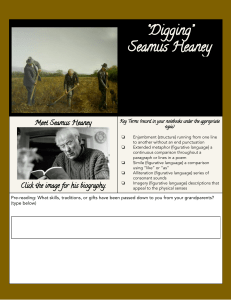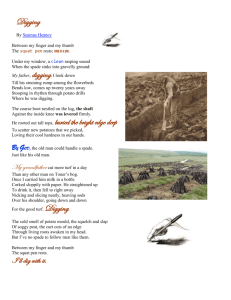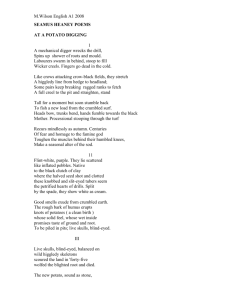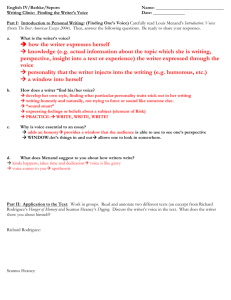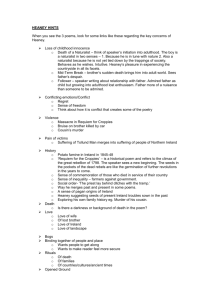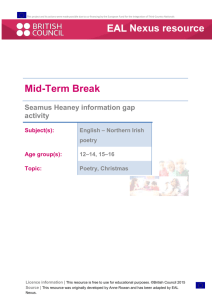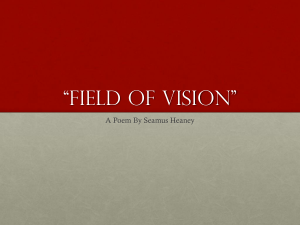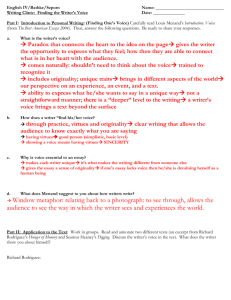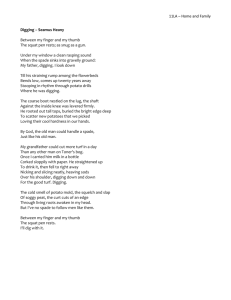(null): DiggingBrownBowen2014PartA
advertisement
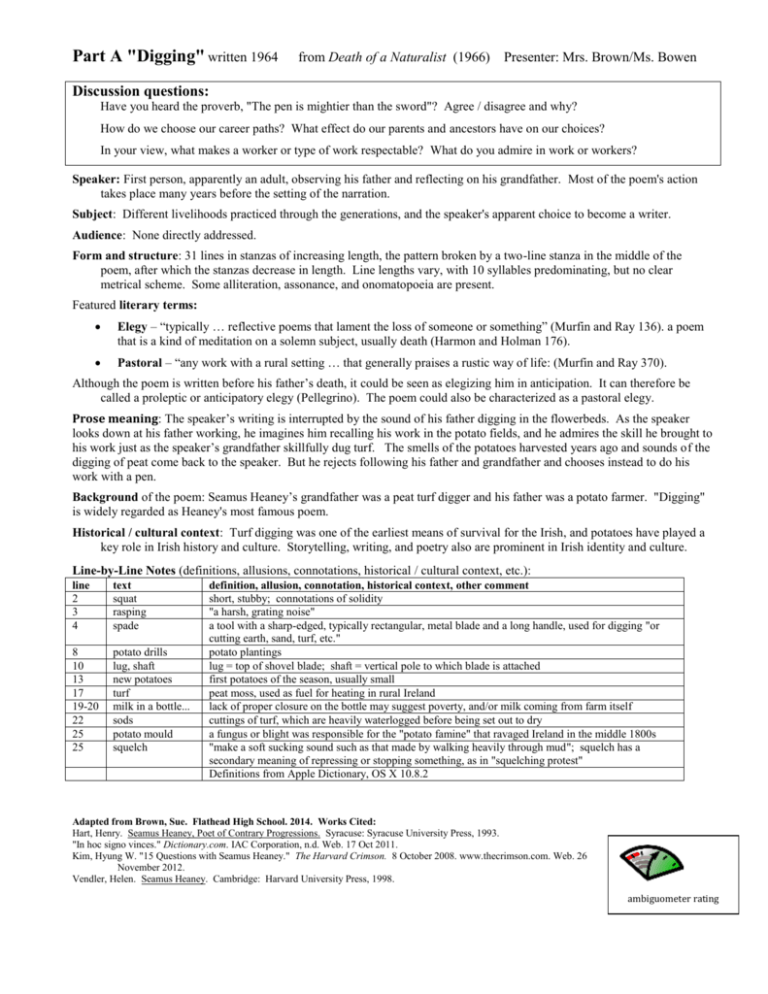
Part A "Digging" written 1964 from Death of a Naturalist (1966) Presenter: Mrs. Brown/Ms. Bowen Discussion questions: Have you heard the proverb, "The pen is mightier than the sword"? Agree / disagree and why? How do we choose our career paths? What effect do our parents and ancestors have on our choices? In your view, what makes a worker or type of work respectable? What do you admire in work or workers? Speaker: First person, apparently an adult, observing his father and reflecting on his grandfather. Most of the poem's action takes place many years before the setting of the narration. Subject: Different livelihoods practiced through the generations, and the speaker's apparent choice to become a writer. Audience: None directly addressed. Form and structure: 31 lines in stanzas of increasing length, the pattern broken by a two-line stanza in the middle of the poem, after which the stanzas decrease in length. Line lengths vary, with 10 syllables predominating, but no clear metrical scheme. Some alliteration, assonance, and onomatopoeia are present. Featured literary terms: Elegy – “typically … reflective poems that lament the loss of someone or something” (Murfin and Ray 136). a poem that is a kind of meditation on a solemn subject, usually death (Harmon and Holman 176). Pastoral – “any work with a rural setting … that generally praises a rustic way of life: (Murfin and Ray 370). Although the poem is written before his father’s death, it could be seen as elegizing him in anticipation. It can therefore be called a proleptic or anticipatory elegy (Pellegrino). The poem could also be characterized as a pastoral elegy. Prose meaning: The speaker’s writing is interrupted by the sound of his father digging in the flowerbeds. As the speaker looks down at his father working, he imagines him recalling his work in the potato fields, and he admires the skill he brought to his work just as the speaker’s grandfather skillfully dug turf. The smells of the potatoes harvested years ago and sounds of the digging of peat come back to the speaker. But he rejects following his father and grandfather and chooses instead to do his work with a pen. Background of the poem: Seamus Heaney’s grandfather was a peat turf digger and his father was a potato farmer. "Digging" is widely regarded as Heaney's most famous poem. Historical / cultural context: Turf digging was one of the earliest means of survival for the Irish, and potatoes have played a key role in Irish history and culture. Storytelling, writing, and poetry also are prominent in Irish identity and culture. Line-by-Line Notes (definitions, allusions, connotations, historical / cultural context, etc.): line 2 3 4 text squat rasping spade 8 10 13 17 19-20 22 25 25 potato drills lug, shaft new potatoes turf milk in a bottle... sods potato mould squelch definition, allusion, connotation, historical context, other comment short, stubby; connotations of solidity "a harsh, grating noise" a tool with a sharp-edged, typically rectangular, metal blade and a long handle, used for digging "or cutting earth, sand, turf, etc." potato plantings lug = top of shovel blade; shaft = vertical pole to which blade is attached first potatoes of the season, usually small peat moss, used as fuel for heating in rural Ireland lack of proper closure on the bottle may suggest poverty, and/or milk coming from farm itself cuttings of turf, which are heavily waterlogged before being set out to dry a fungus or blight was responsible for the "potato famine" that ravaged Ireland in the middle 1800s "make a soft sucking sound such as that made by walking heavily through mud"; squelch has a secondary meaning of repressing or stopping something, as in "squelching protest" Definitions from Apple Dictionary, OS X 10.8.2 Adapted from Brown, Sue. Flathead High School. 2014. Works Cited: Hart, Henry. Seamus Heaney, Poet of Contrary Progressions. Syracuse: Syracuse University Press, 1993. "In hoc signo vinces." Dictionary.com. IAC Corporation, n.d. Web. 17 Oct 2011. Kim, Hyung W. "15 Questions with Seamus Heaney." The Harvard Crimson. 8 October 2008. www.thecrimson.com. Web. 26 November 2012. Vendler, Helen. Seamus Heaney. Cambridge: Harvard University Press, 1998. ambiguometer rating
